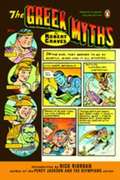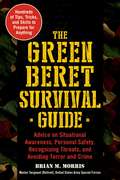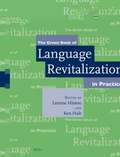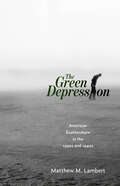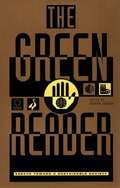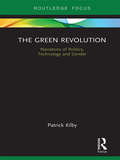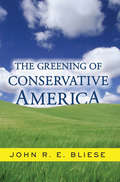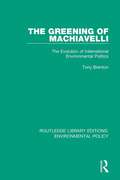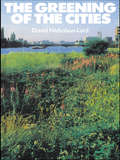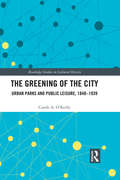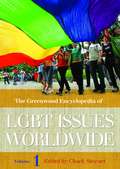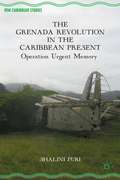- Table View
- List View
The Greek Myths
by Robert Graves Ross Macdonald Rick RiordanRobert Graves, classicist, poet, and unorthodox critic, retells the Greek legends of gods and heroes for a modern audience And, in the two volumes of The Greek Myths, he demonstrates with a dazzling display of relevant knowledge that Greek Mythology is "no more mysterious in content than are modern election cartoons." His work covers, in nearly two hundred sections, the creation myths; the legends of the births and lives of the great Olympians; the Theseus, Oedipus, and Heracles cycles; the Argonaut voyage; the tale of Troy, and much more. All the scattered elements of each myth have been assembled into a harmonious narrative, and many variants are recorded which may help to determine its ritual or historical meaning, Full references to the classical sources, and copious indexes, make the book as valuable to the scholar as to the general reader; and a full commentary on each myth explains and interprets the classical version in the light of today's archaeological and anthropological knowledge.
The Greek Myths
by Robert GravesCombines in a single volume the complete text of the definitive two-volume classic, citing all the ancient myths.
The Greek Myths
by Robert GravesThe Greek Myths is the definitive and comprehensive edition of Robert Graves's classic imaginative and poetic retelling of the Greek myths. 'Icarus disobeyed his father's instructions and began soaring towards the sun, rejoiced by the lift of his great sweeping wings. Presently, when Daedalus looked over his shoulder, he could no longer see Icarus; but scattered feathers floated on the waves below. . . 'Including many of the greatest stories ever told - the labours of Hercules, the voyage of the Argonauts, Theseus and the minotaur, Midas and his golden touch, the Trojan War and Odysseus's journey home - Robert Graves's superb and comprehensive retelling of the Greek myths for a modern audience has been regarded for over fifty years as the definitive version. With a novelist's skill and a poet's eye, Graves draws on the entire canon of ancient literature, bringing together all the elements of every myth into one epic and unforgettable story. Ideal for the first time reader, it can be read as a single, continuous narrative, while full commentaries, with cross-references, interpretations, variants and explanations, as well as a comprehensive index of names, make it equally valuable as a work of scholarly reference for anyone seeking an authoritative and detailed account of the gods, heroes and extraordinary events that provide the bedrock of Western literature. The result is a classic among classics, a treasure trove of extraordinary tales and a masterful work of literature in its own right. 'Among the most generous, self-willed, unseemly and brilliant writers of our century' New York Times Robert Graves (1895 - 1985) was a novelist, poet, historian, critic and translator, author of some 140 books, and one of the greatest figures of 20th century British literature. Alongside The Greek Myths, his most famous works include the historical novels I, Claudius and Claudius the God and his First World War memoir Goodbye to All That. His friendship with fellow war poet Siegfried Sassoon was the subject of Pat Barker's novel Regeneration.
The Greek Revolution and the Greek Diaspora in the United States (Routledge Studies in Modern History)
by Maria KaliambouThis book examines the question of historical awareness within the Greek communities in the diaspora, adding a new perspective on the discussion about the Greek Revolution of 1821 by including the forgotten Greeks in the United States and Canada. The purpose of this volume is to discuss the impact of the Greek Revolution as manifested in various discourses. It is celebrated by the Greek communities, taught in Greek schools, covered in the local newspapers. It is an inspiration for literary, artistic, and theatrical creations. The chapters reflect a broad range of disciplines (history, literature, art history, ethnology, and education), offering both historical and contemporary reflections. This volume produces new knowledge about the Greeks in the United States and Canada for the last 100 years. The Greek Revolution and the Greek Diaspora in the United States will attract scholars, students, and public readers of Modern Greek Studies and Greek American Studies, as well as those interested in comparative history, diaspora and ethnic studies, memory studies, and cultural studies.
The Greeks and the New
by Armand D'AngourThe Greeks have long been regarded as innovators across a wide range of fields in literature, culture, philosophy, politics and science. However, little attention has been paid to how they thought and felt about novelty and innovation itself, and to relating this to the forces of traditionalism and conservatism which were also present across all the various societies within ancient Greece. What inspired the Greeks to embark on their unique and enduring innovations? How did they think and feel about the new? This book represents the first serious attempt to address these issues, and deals with the phenomenon across all periods and areas of classical Greek history and thought. Each chapter concentrates on a different area of culture or thought, while the book as a whole argues that much of the impulse towards innovation came from the life of the polis which provided its setting.
The Greeks: The Land and People Since the War
by James PettiferOur perception of Greece conjures up many potent images: an ancient civilization brought alive by fable, hillsides dotted with sunbaked villages, lazy beaches lapped by crystal blue waters, the warmth and humour of its people. Yet if we look behind the picture-postcard imagery, the painful contradictions of the country begin to emerge. James Pettifer's classic text on Greece, now revised and updated with extensive new material, argues that it is vital to understand this country's present by looking at the far-reaching effects of its troubled past. He surveys the roots of Greek social, economic and political realities with intelligence and convincing clarity.
The Green Beret Survival Guide: Advice on Situational Awareness, Personal Safety, Recognizing Threats, and Avoiding Terror and Crime
by Brian M. MorrisToday's society is one in which we, as individuals, are constantly barraged by the threat of domestic terrorism. The ever-present fear for your safety and the safety of those we love can overwhelm you if you aren’t sure how to protect yourself. Luckily, distinguished combat veteran Brian M. Morris's Green Beret Survival Guide is here to help ease your fears. Using his firsthand knowledge from the field as a Green Beret, Morris concisely outlines the steps that are necessary towards increasing one’s personal safety. Over the course of several chapters, Morris describes the importance of situational awareness, meaning staying alert, being aware of your surroundings, and understanding the reality of threats that you may face in any given situation. An individual with good situational awareness never takes anything for granted and makes security a part of his or her daily routine. By being observant and practicing several different methods of observation, one can avoid falling prey to terrorist, thieves, and other criminals. Using situational awareness as the cornerstone of a personal safety plan, The Green Beret Survival Guide delivers expert advice on preparing you and your loved ones for the worst case scenario.
The Green Book of Language Revitalization in Practice
by Leanne Hinton Kenneth HaleWith world-wide environmental destruction and globalization of economy, a few languages, especially English, are spreading rapidly in use, while thousands of other languages are disappearing, taking with them important cultural, philosophical and environmental knowledge systems and oral literatures. We all stand to suffer from such a loss, none more so than the communities whose very identity is being threatened by the impending death of their languages. In response to this crisis, indigenous communities around the world have begun to develop a myriad of projects to keep their languages alive. This volume is a set of detailed accounts about the kind of work that is going on now as people struggle for their linguistic survival. It also serves as a manual of effective practices in language revitalization. Following are the key features: 23 case studies of language revitalization in practice, from Native American languages, Australian languages, Maori, Hawaiian, Welsh, Irish, and others, written primarily by authors directly involved in the programs; short introductions situate the languages, to help make the languages more 'real' in the minds of readers; each chapter gives a detailed overview of the various kinds of programs and methods in practice today; introductions and maps for each of the languages represented familiarize the reader with their history, linguistic structure and sociolinguistic features; and, strong representation in authorship and viewpoint of the people and communities whose languages are threatened, gives the readers an inside understanding of the issues involved and the community-internal attitudes toward language loss and revitalization. This book was previously published by Academic Press under ISBN 978-01-23-49354-5.
The Green Burial Guidebook: Everything You Need to Plan an Affordable, Environmentally Friendly Burial
by Elizabeth FournierFuneral expenses in the United States average more than $10,000. And every year conventional funerals bury millions of tons of wood, concrete, and metals, as well as millions of gallons of carcinogenic embalming fluid. There is a better way, and Elizabeth Fournier, affectionately dubbed the &“Green Reaper,&” walks you through it, step-by-step. She provides comprehensive and compassionate guidance, covering everything from green burial planning and home funeral basics to legal guidelines and outside-the-box options, such as burials at sea. Fournier points the way to green burial practices that consider both the environmental well-being of the planet and the economic well-being of loved ones.
The Green Case: A Sociology of Environmental Issues, Arguments and Politics (Routledge Revivals)
by Steven YearleyFirst published in 1991, this title provides a comprehensive and objective account of the basis of ‘green’ arguments and their social and political implications. By the beginning of the 1990s, environmental awareness had become widespread, popular, and fashionable throughout the West, adopted by politicians, manufacturers and advertising agencies. The book sets out to explain why and how the ‘green wave’ developed, and examines the forces still shaping green politics and policies at an international level. With important implications across the fields of Sociology, Development Studies and Environment and Sustainability, this reissue will be valuable to a broad student and academic readership.
The Green Depression: American Ecoliterature in the 1930s and 1940s
by Matthew M. LambertDust storms. Flooding. The fear of nuclear fallout. While literary critics associate authors of the 1930s and ’40s with leftist political and economic thought, they often ignore concern in the period’s literary and cultural works with major environmental crises. To fill this gap in scholarship, author Matthew M. Lambert argues that depression-era authors contributed to the development of modern environmentalist thought in a variety of ways. Writers of the time provided a better understanding of the devastating effects that humans can have on the environment. They also depicted the ecological and cultural value of nonhuman nature, including animal “predators” and “pests.” Finally, they laid the groundwork for “environmental justice” by focusing on the social effects of environmental exploitation. To show the reach of environmentalist thought during the period, the first three chapters of The Green Depression: American Ecoliterature in the 1930s and 1940s focus on different geographical landscapes, including the wild, rural, and urban. The fourth and final chapter shifts to debates over the social and environmental effects of technology during the period. In identifying modern environmental ideas and concerns in American literary and cultural works of the 1930s and ’40s, The Green Depression highlights the importance of depression-era literature in understanding the development of environmentalist thought over the twentieth century. This book also builds upon a growing body of scholarship in ecocriticism that describes the unique contributions African American and other nonwhite authors have made to the environmental justice movement and to our understanding of the natural world.
The Green Frogs: A Korean Folktale
by Yumi HeoLike most rebellious children, the green frogs in this Korean folktale love to disobey their mother. Whatever she asks them to do, they do the opposite ... until their bad habit lands them in trouble.
The Green Fuse: An Ecological Odyssey
by John HarteA widely respected ecological scientist and activist draws on the poet's image and his own environmental research to demonstrate the many interconnections among the world's ecosystems. John Harte takes us from Alaskan salmon runs and the Florida everglades to South Pacific coral reefs and the bleak Tibetan plateau. The result is that rare book that bridges the cultures of science and art. Lyrical, vivid portraits of natural wonders and the threats to them are combined with precise scientific accounts of natural processes and their disturbances. The Green Fuse will show nonscientists the fascination of ecological detective work and renew scientists' love for the beauty of the world under their microscopes. Harte's stories illuminate, without sermonizing, the damage to natural systems brought about by technological hubris and calculated political ruthlessness. "The green fuse" symbolizes the basic unity behind natural diversity. But a fuse may also be the weak link in an overloaded system or the slow burning wick on an ecological bomb. As The Green Fuse reminds us, the energies that created human liberation from nature can also be those that lead to the human destruction of nature. This title is part of UC Press's Voices Revived program, which commemorates University of California Press’s mission to seek out and cultivate the brightest minds and give them voice, reach, and impact. Drawing on a backlist dating to 1893, Voices Revived makes high-quality, peer-reviewed scholarship accessible once again using print-on-demand technology. This title was originally published in 1993.
The Green Mister Rogers: Environmentalism in Mister Rogers' Neighborhood (Children's Literature Association Series)
by Jason King Sara LindeyFred Rogers was an international celebrity. He was a pioneer in children’s television, an advocate for families, and a multimedia artist and performer. He wrote the television scripts and music, performed puppetry, sang, hosted, and directed Mister Rogers’ Neighborhood for more than thirty years. In his almost nine hundred episodes, Rogers pursued dramatic topics: divorce, death, war, sibling rivalry, disabilities, racism. Rogers’ direct, slow, gentle, and empathic approach is supported by his superior emotional strength, his intellectual and creative courage, and his joyful spiritual confidence. The Green Mister Rogers: Environmentalism in “Mister Rogers’ Neighborhood” centers on the show’s environmentalism, primarily expressed through his themed week “Caring for the Environment,” produced in 1990 in coordination with the twentieth anniversary of Earth Day. Unfolding against a trash catastrophe in the Neighborhood of Make-Believe, Rogers advances an environmentalism for children that secures children in their family homes while extending their perspective to faraway places, from the local recycling center to Florida’s coral reef. Rogers depicts animal wisdom and uses puppets to voice anxiety and hope and shows an interconnected world where each part of creation is valued, and love is circulated in networks of care. Ultimately, Rogers cultivates a practical wisdom that provides a way for children to confront the environmental crisis through action and hope and, in doing so, develop into adults who possess greater care for the environment and a capacious imagination for solving the ecological problems we face.
The Green Reader: Essays Toward a Sustainable Society
by Andrew DobsonThe Green Reader collects key source documents of today's most important social/scientific/philosophical movement-the Green movement.
The Green Revolution: Narratives of Politics, Technology and Gender (Earthscan Food and Agriculture)
by Patrick KilbyThis book reviews the Green Revolution, starting with its inception and development from the 1940s to the 1970s, and leading to what is commonly referred to as a second Green Revolution in the 2000s. Building on the historical assessment, it draws insights for contemporary policy debates and demonstrates important lessons for the here and now. ‘Green Revolution’ refers to the technical measures employed to increase food (particularly grain) production, based mainly on improved seed varieties for higher yields and pest resistance. For it to be successful the Green Revolution often required land reform, investments in irrigation and fertilizer supply that were not available to women and marginal farmers. This book analyses three underlying principles that have guided green revolutions: the political environment in which they were set; how they contributed to both the successes and challenges the Green Revolution continues to face; and the systemic institutional barriers for access to these agricultural production advances, with a focus on how gender relations limit the inclusion of women even when they are the principle cultivators and farm managers. The book draws on experiences in Mexico, India and China, examining government policy, the role of the family farm, and key issues around the inclusion of women. In doing so, this book connects the history of the Green Revolution with contemporary policy debates on the developing world, particularly in relation to Africa and Asia, around foreign aid and agricultural research. It also specifically establishes that greater inclusivity for women and other marginalised farming communities will significantly enhance the effectiveness of these programs. Interlinking themes of development policy, gender, and agricultural research, this book will be of great interest to students and scholars of agricultural development, food security, and sustainable development, as well as policymakers and practitioners working in international aid and agri-food policies.
The Greening Of Conservative America
by John BlieseIs ?conservative environmentalism? an oxymoron? Is more environmental regulation good for business? The Greening of Conservative America contends that the adherents to any well-considered conservative political philosophy should, on first principles, support pro-conservation, pro-environment policies. Furthermore, and pragmatically, Bliese demonstrates with repeated examples how environmental protection policies actually benefit business by stimulating greater efficiency and innovation and by spurring the creation of green products and services for new markets around the globe. These ideas are applied in chapters on specific environmental issues, including pollution, global warming, biodiversity, public-land management, and sustainability. The book concludes with criticisms of ?free-market environmentalism? and calls conservatives back to their root principles on matters of the environment. Concerned citizens of any political persuasion will find much in this book to inform their views on public debates over environmental issues and policies.
The Greening of America
by Charles A. ReichThere is a revolution coming. It will not be like revolutions of the past. It will originate with the individual and the with culture, and it will change the political structure only as its final act. It will not require violence to succeed, and it cannot be successfully resisted by violence. This is the revolution of the new generation.
The Greening of Machiavelli: The Evolution of International Environmental Politics (Routledge Library Editions: Environmental Policy #4)
by Tony BrentonFirst published in 1994. Environmental issues present a daunting challenge to the international system. The destruction of the tropical rainforest, the Chernobyl explosion and the ozone layer ‘hole’ all underline the transnational nature of environmental threats and the need for states to act together in order to tackle them. How have such environmental issues entered political agendas in different parts of the world and how has that affected national positions? Can governments ever reconcile their own national interests with the international cooperation needed to deal with transboundary issues such as climate change? This book traces the history of international environmental negotiations and regulations and looks at the domestic policies upon which cooperation in the international community depends. It covers some major milestones in recent history, from the Torrey Canyon accident through to the Rio ‘Earth Summit’ and the emergence of the European Community as a major international environmental actor. It also looks at cross-cutting issues such as the role of non-governmental organizations, the environmental impacts of world agriculture and trading arrangements, industry’s attitudes, and the relationship between democracy and environmental protection. It concludes by examining how the international system has adapted, and may adapt further, to deal effectively with environmental problems, and reflects on the implications of this for the future.
The Greening of the Cities
by David Nicholson-LordFirst Published in 2004. Routledge is an imprint of Taylor & Francis, an informa company.
The Greening of the City: Urban Parks and Public Leisure, 1840-1939 (Routledge Studies in Cultural History #73)
by Carole A. O'ReillyUrban parks are a much-loved feature of the city environment. However, our knowledge of the true scale of their impact remains uneven. Much work has been done on their origins and design features, but this book aims to extend this beyond the nineteenth century, examining the fuller flowering of these valuable spaces in the early decades of the twentieth century. Encompassing themes such as social and political usage, parks as employers and the dangers posed by such freely accessible spaces, the book examines a range of parks in cities such as Manchester, Salford, Liverpool, Leeds, Preston, Hull and Cardiff and challenges the prevailing myths about their meaning for their users. This study's timeframe spans almost 100 years of unprecedented social, cultural, political and economic changes and allows for the consideration of the expansion and commercialisation of leisure opportunities for the public. Urban parks played a significant role in this — the book places parks firmly in the context of the evolving city and examines the importance of green space to the urban citizen during this most fascinating of historical periods.
The Greenwood Encyclopedia of LGBT Issues Worldwide, Volume 1: The Americas and the Caribbean
by Chuck K. StewartThis set has an ambitious scope with the goal of offering the most up-to-date international overview of key issues in the lives of lesbian, gay, bisexual, and transgender individuals. HIV/AIDS has been a major media focus, but this set fosters a broader understanding of the status of LGBT individuals in their society. More than 70 countries are represented. The clear, accessible prose is appropriate for high school student research on up. The material is especially needed in a cultural climate that supports and informs about LGBT populations. The content is useful for a paper on a hot topic, health classes, discussion groups, and gay-straight alliance groups. This set has an ambitious scope with the goal of offering the most up-to-date international overview of key issues in the lives of lesbian, gay, bisexual, and transgender individuals. HIV/AIDS has been a major media focus, but this set fosters a broader understanding of the status of LGBT individuals in their society. More than 70 countries are represented. The clear, accessible prose is appropriate for high school student research on up. The material is especially needed in a cultural climate that supports and informs about LGBT populations. The content is useful for a paper on a hot topic, health classes, discussion groups, and gay-straight alliance groups.
The Greenwood Encyclopedia of LGBT Issues Worldwide, Volume 2: Europe
by Chuck K. StewartThis set has an ambitious scope with the goal of offering the most up-to-date international overview of key issues in the lives of lesbian, gay, bisexual, and transgender individuals. HIV/AIDS has been a major media focus, but this set fosters a broader understanding of the status of LGBT individuals in their society. More than 70 countries are represented. The clear, accessible prose is appropriate for high school student research on up. The material is especially needed in a cultural climate that supports and informs about LGBT populations. The content is useful for a paper on a hot topic, health classes, discussion groups, and gay-straight alliance groups.This set has an ambitious scope with the goal of offering the most up-to-date international overview of key issues in the lives of lesbian, gay, bisexual, and transgender individuals. HIV/AIDS has been a major media focus, but this set fosters a broader understanding of the status of LGBT individuals in their society. More than 70 countries are represented. The clear, accessible prose is appropriate for high school student research on up. The material is especially needed in a cultural climate that supports and informs about LGBT populations. The content is useful for a paper on a hot topic, health classes, discussion groups, and gay-straight alliance groups.
The Greenwood Encyclopedia of LGBT Issues Worldwide, Volume 3: Africa and the Middle East
by Chuck K. StewartThis set has an ambitious scope with the goal of offering the most up-to-date international overview of key issues in the lives of lesbian, gay, bisexual, and transgender individuals. HIV/AIDS has been a major media focus, but this set fosters a broader understanding of the status of LGBT individuals in their society. More than 70 countries are represented. The clear, accessible prose is appropriate for high school student research on up. The material is especially needed in a cultural climate that supports and informs about LGBT populations. The content is useful for a paper on a hot topic, health classes, discussion groups, and gay-straight alliance groups.This set has an ambitious scope with the goal of offering the most up-to-date international overview of key issues in the lives of lesbian, gay, bisexual, and transgender individuals. HIV/AIDS has been a major media focus, but this set fosters a broader understanding of the status of LGBT individuals in their society. More than 70 countries are represented. The clear, accessible prose is appropriate for high school student research on up. The material is especially needed in a cultural climate that supports and informs about LGBT populations. The content is useful for a paper on a hot topic, health classes, discussion groups, and gay-straight alliance groups.
The Grenada Revolution in the Caribbean Present
by Shalini PuriThe Grenada Revolution in the Caribbean Present: Operation Urgent Memory is the first scholarly book from the humanities on the subject of the Grenada Revolution and the US intervention. It is simultaneously a critique, tribute, and memorial. It argues that in both its making and its fall, the 1979-1983 Revolution was a transnational event that deeply impacted politics and culture across the Caribbean and its diaspora during its life and in the decades since its fall. Drawing together studies of landscape, memorials, literature, music, painting, photographs, film and TV, cartoons, memorabilia traded on e-bay, interviews, everyday life, and government, journalistic, and scholarly accounts, the book assembles and analyzes an archive of divergent memories. In an analysis that is relevant to all micro-states, the book reflects on how Grenada's small size shapes memory, political and poetic practice, and efforts at reconciliation.
